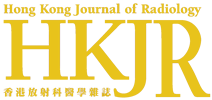A Paradigm Shift in Non–small-cell Lung Carcinoma Treatment
YL Wu
Hong Kong J Radiol 2011;14(Suppl):S77-83
The treatment paradigm of advanced non–small-cell lung carcinoma has evolved considerably owing to advances in molecular targeted therapy and the approval of two new classes of therapeutic agents, namely, epidermal growth factor receptor tyrosine-kinase inhibitors and angiogenesis inhibitors. Studies have shown that the presence of epidermal growth factor receptor–activating mutations is a strong predictor for the efficacy of epidermal growth factor receptor tyrosine-kinase inhibitors therapy. Data from recent phase III studies confirm that epidermal growth factor receptor tyrosine-kinase inhibitors therapy with erlotinib or gefitinib is more effective than standard chemotherapy for the first-line management of receptor mutation-positive patients with advanced non–small-cell lung carcinoma. In particular, erlotinib is the only epidermal growth factor receptor tyrosine-kinase inhibitor to prolong progression-free survival by more than 12 months when used for these patients in the setting of first-line therapy. In addition, data from CTONG0803, a phase II study, revealed that erlotinib monotherapy was effective in the treatment of epidermal growth factor receptor mutation-positive non–small-cell lung carcinoma patients with asymptomatic brain metastases. The efficacy and safety of firstline bevacizumab-based chemotherapy in Asian populations with advanced non-squamous non–small-cell lung carcinoma was recently confirmed in subgroup analyses of two studies. Both studies established the benefit of first-line bevacizumab in advanced non-squamous non–small-cell lung carcinoma. Moreover, data from the recent phase III AVAPERL study showed that continued maintenance therapy with bevacizumab and pemetrexed combination was effective in prolonging the survival of patients with advanced non-squamous non–small-cell lung carcinoma who respond to first-line bevacizumab-based induction chemotherapy.
中文摘要
非小細胞肺癌療法的方案轉移
吳一龍
隨著分子標靶療法的發展,加上對表皮生長因子受體﹣酪胺酸酶抑制劑(EGFR-TKI)及血管新生抑 制劑兩種藥物的認可,治療晚期非小細胞肺癌的方案不斷演進。研究顯示表皮生長因子受體的突變 可預測對EGFR-TKI療法的療效。對於受體突變呈陽性的晚期非小細胞肺癌患者,最近的第三期研 究結果確定了EGFR-TKI作為第一線治療 (結合erlotinib或gefitinib),比傳統化療法更為有效。值得注 意的是,當用作第一線藥物時,erlotinib是唯一一個EGFR-TKI可延長患者的無惡化生存期超過12個 月。此外,一項第二期研究(CTONG0803)的結果亦顯示erlotinib單一療法可有效醫治帶有無症狀腦轉移癌的表皮生長因子受體突變呈陽性的非小細胞肺癌患者。另兩項研究的亞群組分析中,確認了 以bevacizumab為基礎的化療對於非鱗狀非小細胞肺癌患者的效用及安全性,確定了bevacizumab醫治 非鱗狀非小細胞肺癌患者的好處。另一項第三期研究(AVAPERL)結果顯示對於一線bevacizumab導 引治療有反應的晚期非小細胞肺癌患者,結合bevacizumab及pemetrexed的持續性維持治療可以延長 其存活期。

